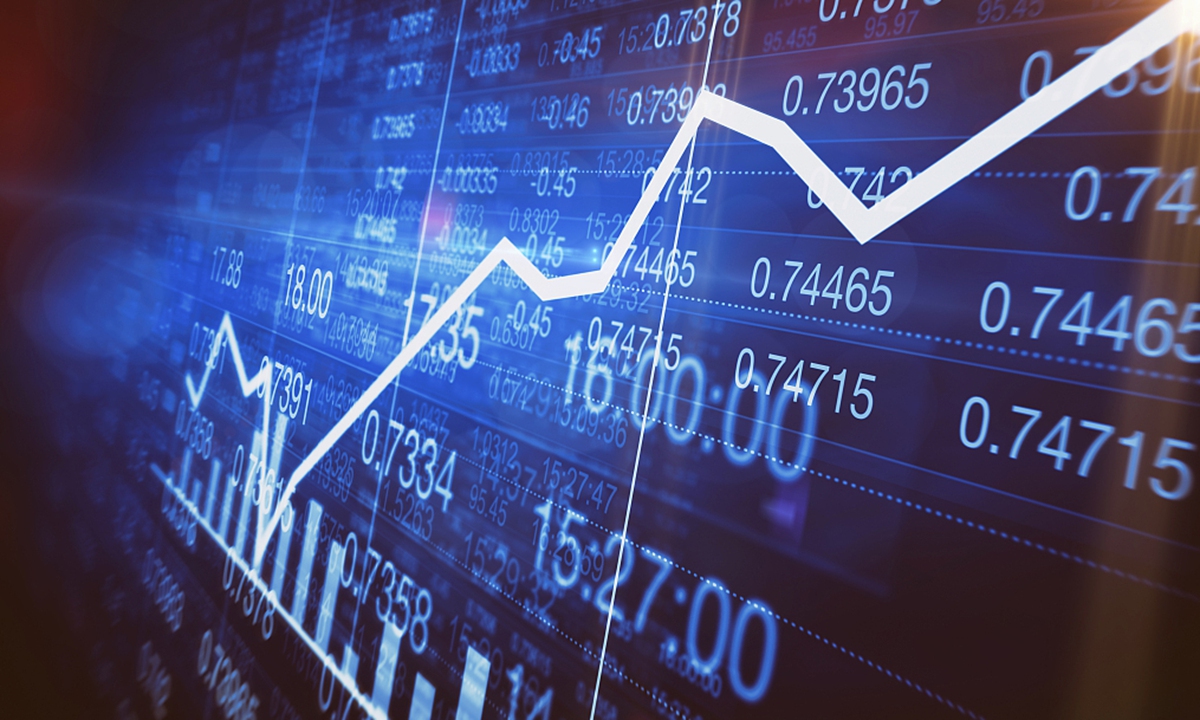Chinese stocks mount solid recovery on first trading day of 2023 amid optimism for economic rebound

stock market Photo:VCG
Chinese stocks both on the mainland and in Hong Kong made solid gains on Tuesday, the first trading day of 2023, after overcoming earlier losses, with certain indexes pointing to the best start to a year in four years, with investors increasingly upbeat over a broad robust recovery in the world's second-largest economy following China's recently adjusted COVID-19 response.
Markets are boosted by growing signs of fast recovery in economic activities in many major cities during the New Year's Day holidays after the recent COVID exit wave, analysts noted. However, the main driving force is growing optimism over China's accelerating economic rebound in 2023, with many economists expecting the Chinese economy to be one of the brightest spots in another widely expected tough year for the global economy.
Still, the volatility in morning trading sessions on the mainland and Hong Kong stock markets underlined lingering challenges and risks for the Chinese economy, ranging from the domestic epidemic situation to global recessionary risks to geopolitical and trade tensions, analysts said, noting that various policy measures should be well executed to effectively boost consumption and investment and support businesses, particularly private and small- and medium-sized businesses.
Impressive start
After opening lower on Tuesday morning, all three major stock indexes on the Chinese mainland gained, with the Shanghai Composite Index up 0.88 percent, or 27.25 points, to 3,116.51, the Shenzhen Component Index rising 0.92 percent at 11,117.13 points and the ChiNext Index, tracking China's NASDAQ-style board of growth enterprises, up 0.41 percent at 2,356.42 points. While the gains are relatively moderate, they are impressive given earlier losses. The ChiNext Index lost as much as 1 percent in the morning, while the Shenzhen index dropped 0.61 percent.
The V-shaped recovery in Chinese stocks were more pronounced in Hong Kong on Tuesday. The benchmark Hang Seng Index closed 1.84 percent higher, after diving as much as 2.4 percent at one point. Moreover, in another sign of bullish market sentiment on the recovery of the Chinese economy, the Hang Seng China Enterprises Index, which tracks mainland firms listed in Hong Kong, overcame earlier losses to gain 1.9 percent on Tuesday, the best start to a year since 2018, according to Bloomberg.
The stock market performance on Tuesday was a reflection of investors' growing optimism over China's economic recovery from the COVID-19 epidemic after the three-day New Year's Day holidays, according to He Weiwen, a senior fellow at the Center for China and Globalization.
"The stock market is about expectations. If expectations are good, it will go up. If expectations are grim, then it would definitely not go up. So, overall expectations are upbeat," He told the Global Times on Tuesday, while pointing to what he described as a better-than-expected recovery in economic activities during the New Year's Day holidays.
During the three-day holidays, the first official holiday after China adjusted its COVID-19 response in early December, a total of 52.7 million domestic trips were made, up 0.44 percent from last year, while tourism revenue grew 4 percent to 26.52 billion yuan, according to the Ministry of Culture and Tourism. Total trips recovered to 42.8 percent of pre-pandemic levels in 2019 and revenue recovered to 35.1 percent.
"In other words, it is better than originally imagined. Many thought that due to the infection peak amid the exit wave in many places, people would stop moving. But seeing videos of many people out on the streets in Beijing and Shanghai was a bit beyond expectations," He said. "That is to say, the epidemic outbreak's impact on the economy is temporary, and once the epidemic stabilizes, there will be a rapid recovery."
In another sign, China's national railway operator, China State Railway Group Co, said on Tuesday that it aims to increase passenger volume in 2023 by 67.6 percent and total revenue by 17.9 percent to overall recovery to the pre-pandemic level of 2019, according to a statement sent to the Global Times.
Contrary to the rather grim pictures painted by some Western media outlets for the Chinese economy, investors have been upbeat about China's economic recovery over the past two months. Thanks to such optimism on China's reopening, the Hang Seng Index surged 36 percent in the last two months, outperforming a broader Asian index by over 20 percentage points, according to Bloomberg.
A bright spot
Apart from the recent signs of improving economic activity, China's economic fundamentals and its relatively more secure and stable economic situation compared to other major economies as well as better expectations for China's policies going forward, have also boosted confidence in the Chinese economy, according to Cao Heping, an economist at Peking University.
"As epidemic prevention and control measures have been relaxed and with the support of fiscal and monetary policies, various factors have contributed to improving expectations for the economy in 2023," Cao told the Global Times on Tuesday.
In another sign of growing confidence in China's economic recovery, the Chinese yuan strengthened to a four-month high against the US dollar in the offshore market on Tuesday.
However, as the V-shaped performance of the stock market on the first trading day of 2023 shows, China's economy will continue to face downward pressure in the first several months of the year, before a robust recovery later in the year, analysts noted.
Externally, many of the challenges will persist and could even further deteriorate in 2023. Many are watching closely the direction of the Ukraine situation, as some fear that it could trigger a broader crisis. The US' protectionism and relentless crackdown campaign is also widely expected to continue, if not escalate. While the global economic downturn is expected to worsen, with the head of the IMF warning that one-third of the global economy could slide into recession this year, all of these could mean weaker external demand for Chinese exports, analysts noted.
Internally, the epidemic is still affecting businesses across the country despite recent improvements, with analysts expecting a more pronounced recovery in the second quarter.
"In 2022, while external challenges such as the Russia-Ukraine conflict, a global downturn and the US' unilateral and protectionist policies exerted pressure on China's economy, COVID-19 has been the main challenge, Cao said, "so with the epidemic stabilizing, along with policies in place, the outlook for the Chinese economy has become brighter."
Given the external and internal challenges, Chinese policymakers are emphasizing boosting internal demand in 2023, with the Central Economic Work Conference stressing prioritizing the recovery and expansion of consumption. Following the meeting, many Chinese localities have taken measures, including issuing consumption coupons, to boost consumption.
Given the policy support and the easing of the epidemic, "a restorative growth in consumption should be predictable," Yang Delong, chief economist at Shenzhen-based First Seafront Fund Management Co, told the Global Times on Tuesday.
In terms of fiscal and monetary policies, Yang said, rising expectations for the US Federal Reserve to stop its aggressive rate hikes will also offer a relatively better environment.
In addition to efforts to boost domestic demand, China should take active measures to expand market opening, break blockades, cultivate new competitive industries and stabilize supply chains in order to tackle external challenges, He said.
"Only when preparations are made in these aspects can strong support for economic recovery be ensured," He said.


